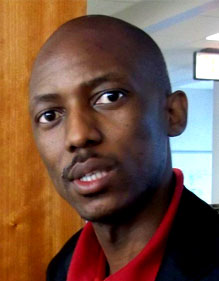|
Getting your Trinity Audio player ready...
|
 By Valencia Talane
By Valencia Talane
When the school governing body (SGB) system works, it works very well. When it doesn’t, the consequences are disastrous and it is usually learners who suffer the most. This is the view of Thabo Shole-Mashao, a TV and radio personality and an entrepreneur. Until the end of 2014, Shole-Mashao had been chairperson of the SGB at Princess High School on Johannesburg’s west rand.
He believes that greater support from government could benefit SGBs in the future and strengthen their accountability role in the community.
The national Department of Basic Education rolled out the current phase of SGB elections across the country on 6 March. According to the department, well over 200 000 public schools nationwide are expected to elect new SGBs between then and the cut-off date of 28 March. The SGBs elected this year will sit for the next three years.
The department, along with its provincial charges, has urged all parents with children in public schools to take the initiative of familiarising themselves with the election processes and taking an active role in the governance of their children’s school.
For Shole-Mashao, the role was not always an attractive one. He had taken an interest in the affairs of Princess High since becoming his brother’s legal guardian after their parents’ passing, but was cautious about committing himself beyond the regular parents’ meetings and the annual general meeting. It was not until a fateful phone call from the school’s principal – who was calling for a parents’ meeting in which by-elections for new SGB members would take place – that he was spurred into action.
“There was a vacuum in the capacity of the SGB of the school at the time,” he explains. “I think there were some resignations from the board, so we had by-elections where we had to replace some of the members that had left the SGB.” Very few parents had turned out for the meeting, but a structure was needed that would prioritise the management of the school.
Shole-Mashao was co-opted as an ordinary member of the interim SGB, with the national elections scheduled for a few months later, when a new cycle would start.
“You know that we have them every three years or so – I think the term of the old SGB expired a few months after the by-elections, so we had to contest proper elections.”
It was not long before the father of two realised the implications of his election to the body. “There was no structure, right at the beginning. So as the SGB at the time we had to create the structure and create committees.” The purpose was to establish responsibilities for the committees they had formed and to create an accountability process.
“The second challenge was that there had been a lot of confrontations, unpleasant head-banging between the [previous] SGB and the staff [of the school],” he says. “It was a one-man show, prior to that. This is what I am told. I have already conceded that I was not involved to the extent where I would have known what was going on prior to my participation.”
The challenge of restoring trust and a good working relationship between the governing body and the teachers was one the parents took on with a positive approach, he recalls. “They [the teachers] were apprehensive, justifiably so one could say. We’re talking about adults who have their own set of opinions, who are qualified in their own respects, and who are professionals, and to sway their thinking takes a lot.”
Getting things on track
Eventually a decent working relationship was established and the teachers warmed up to working with the SGB.
But what about the principal?
“We were very fortunate because the principal was forward in her thinking. She had an insight of sorts and she wanted a proper structure to be run. She wanted systems to be in place and she was hands-on herself.”
A curious factor of her leadership, however, Shole-Mashao added, was how this insight and vision seemed to not have got the better of the alleged inappropriateness of the previous SGB leadership. “With us she was on board, she was very hands on and keen. She was happy to orientate us into the roles and to guide us where we lacked knowledge of either legislation or conventions.”
“Fortunate” is an apt description by Shole-Mashao. Not all schools have supportive principals with honest intentions. Since the inception of its schools campaign, Corruption Watch has received hundreds of reports alleging maladministration and corrupt relationships, particularly between principals and the chairpersons of governing bodies.
In a lot of the cases, the two collude – ostracising the rest of the governing body and members of staff in their activities – to embezzle school funds or channel contracts towards businesses owned by friends and family. The result is usually the resigned attitude of the rest of the members, who often feel disillusioned about fighting the corruption they witness.
The problem of improper influence in school governance, says Shole-Mashao, does not end there. What he terms the politicisation of SGBs is also a serious concern. “We have [political] party members on the SGB who want to push a certain agenda, to infiltrate structures such as the SGB to influence the appointment of teachers, principals and so on.
This, he says, was one of their biggest obstacles. “You have people who are affiliated to certain unions and obviously work hand in hand with people from a certain party, so they would want to influence.
“They come prepared – we also sit in on interviews of teachers and other staff members – so when we sit in those they come ready and prepared that ‘this is our candidate’ and they would have briefed their candidate. So we had to make sure that we have systems in place to deal with that.”
He further explains that the way SGB-run appointments are handled is that the department provides interview packs that come sealed and must be opened in front of all SGB members. These include CVs, application forms and qualifications of people who have been shortlisted by the department.
“Then you sit in a special meeting and then you shortlist and you say ‘yes, this person does meet these criteria that have been set and they go in, and this one doesn’t so they’re out’. It must be transparent and everyone must see that indeed that person qualifies. In the next meeting you call for interviews and you must give them seven working days to attend the interview.”
Transparency and fairness
To avoid the problem of interference from political or union representatives, Shole-Mashao’s team would only draw up interview questions on the morning of the interviews. “[This is] so that the questions are not snuck out to candidates who would then come fully prepared. Obviously then you have the union observers who sit throughout that process – they are just observers and cannot participate.”
The team also adopted a scoring system where each panellist would score a candidate independently before the collective scores are revealed, with the observers present.
“In all the sessions we have sat in, they have never lodged a complaint or anything of the sort. This is because the process was made so transparent that no-one can question anything untoward towards the SGB.”
“So we would choose three candidates in their order of qualification. In the morning we would write our questions and put all our cellphones away. Then we call the first candidate immediately after writing the questions, so that there is no interaction between the candidate and those present.”
Success depends on parents’ participation
For any parent considering taking on the task of being an SGB member, Shole-Mashao has one piece of advice: be aware of what the responsibility entails and open yourself up to learning new things.
“Some parents avail themselves in an election, but their participation wains once they’ve been elected.”
Parents must elect those whom they feel will serve their children’s education best, he explains, and not merely someone who is popular, or might come with pre-determined agendas.
“They must also raise their hands if they feel they can do a better job than someone else.”
Shole-Mashao believes participation is key and schools need to capitalise on the enthusiasm of parents whose children are new to that level of schooling. “At grade 8, right at the beginning, you need to grab the opportunity and create a culture right there. You need to put it to them that if you cannot participate, you cannot come into this school.”
The department, he feels, can also do more for the improvement of SGBs. “They need to look into having a structure that can assist SGBs, not just from the point of view of training, but also monitoring.
“They must have teams that are set up to monitor SGB functioning, to sit with them and make sure they adhere to the regulations and know what they are doing.”








